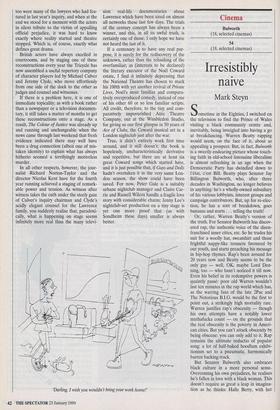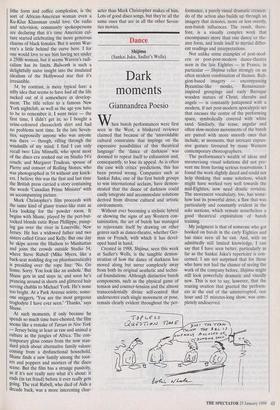Cinema
Bulworth
(18, selected cinemas)
54
(18, selected cinemas)
Irresistibly naive
Mark Steyn
Sometime in the Eighties, I switched on the television to find the Prince of Wales visiting a black community centre and, inevitably, being inveigled into having a go at breakdancing. Warren Beatty rapping would seem, on the face of it, about as appealing a prospect. But, in fact, Bulworth is a sweetly endearing picture whose touch- ing faith in old-school limousine liberalism is almost refreshing in an age when the Democratic Party has dwindled down to l'etat, c'est Bill. Beatty plays Senator Jay Billington Bulworth, who, after three decades in Washington, no longer believes in anything: he's a wholly-owned subsidiary of his various lobbyists, interest groups and campaign contributors. But, up for re-elec- tion, he has a sort of breakdown, goes bananas and starts . . . telling the truth!
Or, rather, Warren Beatty's version of the truth. For Senator Bulworth has discov- ered rap, the authentic voice of the disen- franchised inner cities, etc. So he trades his suit for a woolly hat, sweatshirt and those frightful nappy-like trousers favoured by our youth, and starts preaching his message in hip-hop rhymes. Rap's been around for 20 years now and Beatty seems to be the only guy — well, OK, maybe Lord Den- ning, too — who hasn't noticed it till now. Even his belief in its redemptive powers is quaintly passé: poor old Warren wouldn't last ten minutes in the rap world which has, as the warring fans of the late 2Pac and The Notorious B.I.G. would be the first to point out, a strikingly high mortality rate. Warren justifies rap's obscenity — though his own attempts have a notably lower muthafucka count — on the grounds that the real obscenity is the poverty in Ameri- can cities. But you can't attack obscenity by being obscene: you can only add to it. Rap remains the ultimate reductio of popular song: a lot of half-baked hoodlum exhibi- tionism set to a pneumatic, harmonically barren backing-track.
But Senator Bulworth also embraces black culture in a more personal sense. Overcoming his own prejudices, he realises he's fallen in love with a black woman. This doesn't require as great a leap in imagina- tion as he thinks: Halle Berry, with her lithe form and coffee complexion, is the sort of African-American woman even a Ku-Klux Klansman could love. On radio and television, community spokespersons are declaring that it's time American cul- ture started celebrating the more generous charms of black females. But it seems War- ren's a little behind the curve here. I for one would love to see him having sex under a 2501b woman, but it seems Warren's radi- calism has its limits. Bulworth is such a delightfully naive insight into the insulated idealism of the Hollywood star that it's irresistible.
54, by contrast, is more typical fare: a nifty idea that seems to have had all the life sucked out of it somewhere in develop- ment. The title refers to a famous New York nightclub, as well as the age you have to be to remember it. I went twice — the first time, I didn't get in; so I bought a urine-coloured cheesecloth shirt and had no problems next time. In the late Seven- ties, supposedly anyone who was anyone was there — though, rifling through the windmills of my mind, I find I can only recall two: Liza Minnelli, who spent most of the disco era zonked out on Studio 54's couch; and Margaret Trudeau, spouse of Pierre and consort of Rolling Stones, who was photographed in 54 without any knick- ers. I believe this was the first and last time the British press carried a story containing the words 'Canadian Prime Minister' with an accompanying picture.
Mark Christopher's film proceeds with the same kind of glassy trance-like state as Liza looking for the powder room. It begins with Shane, played by the pert-but- tocked blonde cutie Ryan Phillippe, pump- ing gas over the river in Loserville, New Jersey. He has a widowed father and two sisters called Grace and Kelly. But one day he skips across the Hudson to Manhattan and joins the crowds outside Studio 54, where Steve Rubel] (Mike Myers, like a back-seat nodding dog on pharmaceuticals) is presiding over the rope line: 'No. Go home. Sorry. You look like an asshole.' But. Shane gets in and stays in, and soon he's prancing around in shorts and glittered hair serving chablis to Michael York. He's none too bright. At a Park Avenue soiree, some- one sniggers, 'You are the most gorgeous troglodyte I have ever seen.' Thanks,' says Shane.
At such moments, if only because he spends so much time bare-chested, the film seems like a remake of Tarzan in New York — Jersey being at least as raw and animal a culture as the jungles of Africa. The con- temporary gloss comes from the now stan- dard pitch about alternative family values: coming from a dysfunctional household, Shane finds a new family among the toot- ers and poppers and snorters of the disco scene. But the film has a strange passivity, as if it's not really sure what it's about: it ends (in tax fraud) before it ever really gets going. The real Rube11, who died of Aids a decade back, was a more interesting char- acter than Mark Christopher makes of him. Lots of good disco songs, but they're all the same ones that are in all the other Seven- ties movies.



























































 Previous page
Previous page